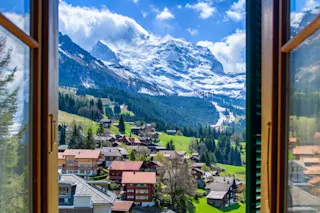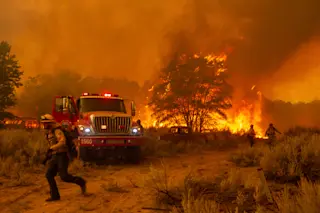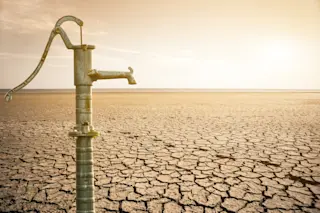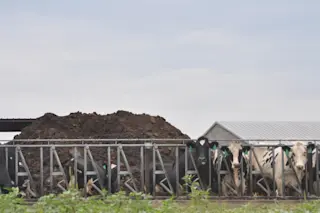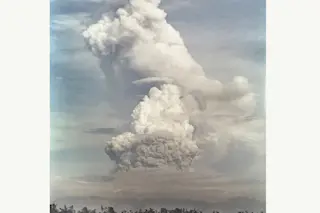On Saturday, the International Herald Tribune (a global version of the New York Times) reported on its Rendezvous blog: "Environmental warning fatigue sets in." The post was a quick summary of a new poll that reveals:
Environmental concerns among citizens around the world have been falling since 2009 and have now reached twenty-year lows, according to a multi-country GlobeScan poll.
This is the sort of news that would almost certainly have appeared on the New York Times Green blog, but on Friday the Times shut it down, which triggered immediate waves of angst and outrage in journalism (and environmental) circles. The move shouldn't come as a total surprise. Two months ago, the Timesdismantled its "environmental desk," which essentially was a pool of reporters and editors dedicated to environmental issues. (Nobody was fired; reporters were assigned to other areas of the paper.) So has environmental fatigue set in at the Times? Some perspective is warranted. After the NYT announced it was closing down its "environmental desk," the Atlanticnoted:
Environment reporting in general has been declining in recent years. But the Times has been running more environment stories than any other newspaper, according to a recent study by the Center for Science & Technology Policy Research.
Additionally, after that January announcement, Dean Baquet, the paper's managing editor for news operations, said:
We have not lost any desire for environmental coverage. This is purely a structural matter.
Perhaps. But as Margaret Sullivan, the Times' Public Editor, wrote at the time:
Symbolically, this is bad news. And symbolism matters – it shows a commitment and an intensity of interest in a crucially important topic.
And now, the shuttering of the Green blog reinforces the perception that, contrary to what Baquet has asserted, the NYT is downsizing its environmental coverage. I don't see how the latest move can be read any other way. Bill McKibben may not be the most impartial observer, but these sardonic observations are spot on:
NYT kills its Wall St. blog, no I mean its Wheels blog, no I mean its Bucks blog. No, actually I mean its Green blog. insideclimatenews.org/breaking-news/… — Bill McKibben (@billmckibben) March 2, 2013
NYT kills its Slapshot blog, no I mean its horseracing blog, no i mean its fashion blog. No, I mean its Green blog insideclimatenews.org/breaking-news/… — Bill McKibben (@billmckibben) March 2, 2013
Andrew Revkin drives home this point in his "farewell" Dot Earth post on the Green blog's demise:
The news side of The Times has nine sports blogs; nine spanning fashion, lifestyles, health, dining and the like; four business blogs; four technology blogs (five if you include automobiles as a technology); and a potpourri of other great efforts, with four of my favorites being the Learning Network blog, Scientist at Work, the IHT Rendezvous blog on global news and Lens, run by the paper’s photo staff. You can tour the paper’s blogosphere here. I would like to have thought there was space for the environment in that mix, even though these issues are still often seen by journalists weaned on politics as a sidenote (remember Candy Crowley‘s post-debate comment about “all you climate change people”?).
There's more to it than that, I think. Environmental journalism has, unfairly or not, a perception problem. Bud Ward, writing ten years ago in Harvard's Nieman Reports, discussed a charge then hurled at environmental journalists: "greens with press passes." Ward, himself a veteran environmental reporter and now the editor of Yale's Forum on Climate Change & the Media, wrote:
Those four words sum up the view—and for many environmental journalists the nagging frustration—that reporters covering the environmental beat often are seen not as environmental reporters but as environmentalist reporters. Is it something they said that earned them such a derisive nickname? Or something they did? Or perhaps something they didn’t say or didn’t do? Though causes remain undetermined, this perception has become an occupational hazard. And it’s a perception the most dedicated U.S. journalists—swearing allegiance to the practice of independent journalism, not to environmental values per se—find particularly annoying. Especially frustrating to many is that this view often persists in the newsroom itself, not just outside of it. Being labeled a “green reporter” by a newsroom colleague is for many an insult. Plain and simple.
Does that perception still linger in newsrooms? More importantly, is it true? Personally, I don't think the "greens with press passes" accusation is fair. (Well, maybe at some places--but not across the board.) Reporters on the environment beat (especially in newspapers) work within the norms of the profession,which means that stories on problems (oil spills!) and conflict (climategate!) and the latest study on fracking, climate tipping points, etc get played up. It is a gloom and doom beat, as science journalist Michelle Nijhuis has pointed out:
Environmental journalists often feel married to the tragic narrative. Pollution, extinction, invasion: The stories are endless, and endlessly the same. Our editors see the pattern and bury us in the back pages; our readers see it and abandon us on the subway or in the dentist’s office.
Might this endless (and often simplistic) tragic narrative be wearing out the public and wearing thin in newsrooms?





